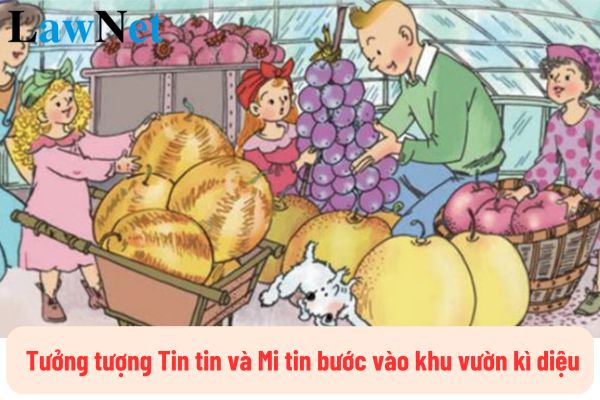Vietnam: What are the sample imaginary paragraphs on Tin-tin and Mi-tin entering the magical garden for 4th-grade students? What are the 05 essential qualities required for 4th-grade students?
What are the sample imaginary paragraphs on Tin-tin and Mi-tin entering the magical garden for 4th-grade students in Vietnam?
Imaginary stories of Tin-tin and Mi-tin are a form of creative writing where the young characters, Tin-tin and Mi-tin, are placed in different scenarios, spaces, and times, often in extraordinary and magical places. They could meet fairy characters, embark on interesting adventures, and discover new things.
Writting an imaginary paragraph on Tin-tin and Mi-tin entering the magical garden is practiced within the 4th-grade Vietnamese literature curriculum.
4th-grade students can refer to the following sample imaginary paragraphs on Tin-tin and Mi-tin entering the magical garden:
|
Sample imaginary paragraphs on Tin-tin and Mi-tin entering the magical garden
|
*Note: The above sample imaginary paragraphs on Tin-tin and Mi-tin entering the magical garden for 4th-grade students in Vietnam are for reference only./.

What are the sample imaginary paragraphs on Tin-tin and Mi-tin entering the magical garden for 4th-grade students in Vietnam? What are the 05 essential qualities required for 4th-grade students? (Image from the Internet)
What are the 05 essential qualities required for 4th-grade students in Vietnam?
According to the General Education Program issued with Circular 32/2018/TT-BGDDT (with some amendments from Articles 1 and 2 of Circular 13/2022/TT-BGDDT), the 05 essential qualities required for 4th-grade students in Vietnam include:
(1) Patriotism
- Love nature and engage in practical actions to protect it.
- Love the homeland and the nation, respecting national symbols.
- Respect and be grateful to laborers and those who contributed to the homeland and country; participate in activities to honor and acknowledge those who contributed to the homeland and country.
(2) Compassion
- Love and care for people:
+ Love, care, and tend to family members.
+ Cherish friends and teachers; encourage and motivate peers.
+ Respect elders; assist the elderly, the sick, and the disabled; be considerate and helpful to younger children.
+ Share with disadvantaged peers, those in remote areas, the disabled, and compatriots affected by natural disasters.
- Respect differences among people:
+ Respect the differences among classmates regarding dress, temperament, and family background.
+ Avoid discrimination and division among friends.
+ Be willing to forgive a friend’s mistakes.
(3) Diligence
Love learning
- Attend school regularly and on time.
- Consistently complete learning tasks.
- Eager to learn and read books to broaden knowledge.
- Show awareness in applying school-learned knowledge and skills to daily life.
Love working
- Regularly participate in family tasks suited to one’s ability.
- Actively engage in school and community activities within one’s capacity.
(4) Honesty
- Be truthful and straightforward in study, labor, and daily life; confidently express personal opinions.
- Always keep promises; bravely admit mistakes, correct them, and uphold right and good deeds.
- Avoid taking belongings or money from family, friends, teachers, and others without permission.
- Disapprove of dishonest behaviors in study and life.
(5) Responsibility
Be responsible for oneself:
- Maintain hygiene, exercise regularly, and take care of health.
- Live in a disciplined manner.
Be responsible for the family:
- Take care of personal and family belongings.
- Avoid wasting food and drinks; save money and household resources.
Be responsible for the school and society:
- Volunteer to adhere strictly to school regulations and community conventions; maintain cleanliness; protect public property.
- Avoid disorderly conduct, arguments, or fights.
- Remind peers to follow school rules; encourage family members to follow public regulations.
- Be responsible for assigned tasks at school and in the classroom.
- Actively participate in collective and age-appropriate social activities.
Be responsible for the environment:
- Care for and protect greenery and beneficial animals.
- Maintain environmental hygiene, avoiding littering.
- Discourage harmful acts against nature.
What are the regulations on the assessment documents for 4th-grade students in Vietnam?
Under Article 10 of the Regulations issued with Circular 27/2020/BGDDT, the assessment documents for 4th-grade students are stipulated as follows:
- Assessment documents shall serve as proof for learning, training processes and learning results of students; as the basis for increasing cooperation between teachers, schools and students’ parents in educating students.
- Assessment documents in each school year of a student consist of study records (under Annex 1 attached hereto) and Schedules for consolidated academic assessment results (under Annex 2 attached hereto).
+ Schedules for consolidated academic assessment results of classes shall be stored in schools as per the law.
+ Study records shall be stored by schools throughout the period in which students study in the schools and handed to the students when they finish primary education programs or move to other schools.

